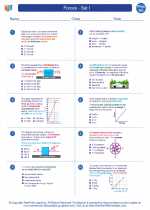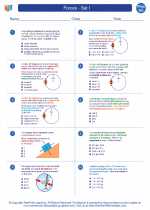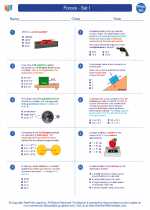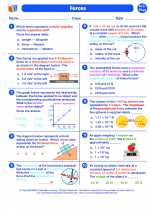Renewable Energy
Renewable energy is energy that is collected from resources that are naturally replenished on a human timescale, such as sunlight, wind, rain, tides, waves, and geothermal heat. This type of energy is considered to be sustainable and environmentally friendly, as it does not deplete the Earth's resources and does not contribute to greenhouse gas emissions.
Sources of Renewable Energy
There are several sources of renewable energy:
- Solar Energy: This is energy collected from the sun's rays and can be converted into electricity using photovoltaic cells or used directly for heating and lighting.
- Wind Energy: Wind turbines convert the kinetic energy of the wind into electricity.
- Hydropower: This is energy generated from flowing water, typically through the use of hydroelectric dams.
- Geothermal Energy: Heat from the Earth's core is used to generate electricity or for heating purposes.
- Biomass: Organic materials such as wood, agricultural residues, and municipal solid waste can be burned or converted into biofuels for energy production.
Advantages of Renewable Energy
Renewable energy offers several advantages over non-renewable sources:
- Lower environmental impact: Renewable energy sources produce minimal greenhouse gas emissions and reduce air and water pollution.
- Energy security: These sources are readily available and do not rely on imports from other countries, enhancing energy security.
- Economic benefits: The renewable energy sector can create jobs and stimulate economic growth.
- Long-term sustainability: Unlike finite fossil fuels, renewable resources are inexhaustible on human timescales.
Challenges of Renewable Energy
While renewable energy has many benefits, there are also challenges to its widespread adoption:
- Intermittency: Some renewable sources, such as solar and wind, are dependent on weather conditions and can be intermittent.
- Energy storage: Storing energy from renewable sources for times when they are not actively producing energy is a significant challenge.
- Initial costs: The installation and infrastructure costs for renewable energy technologies can be high, although they are decreasing as technology advances.
- Land use: Some renewable energy technologies, such as large-scale solar and wind farms, require significant land area for installation.
Study Guide
If you're studying renewable energy, here are some key topics to focus on:
- Understanding the different renewable energy sources and their mechanisms for energy production.
- Exploring the environmental and economic benefits of renewable energy compared to non-renewable sources.
- Investigating the challenges and limitations of integrating renewable energy into existing energy systems.
- Examining the developments in renewable energy technologies and their potential for future energy production.
- Considering the policy and regulatory frameworks that support the adoption and investment in renewable energy.
Renewable energy is an exciting and rapidly evolving field with the potential to transform the way we generate and consume energy. Understanding its principles and applications is essential for a sustainable future.
.◂Physics Worksheets and Study Guides High School. Forces - Set I

 Worksheet/Answer key
Worksheet/Answer key
 Worksheet/Answer key
Worksheet/Answer key
 Worksheet/Answer key
Worksheet/Answer key
